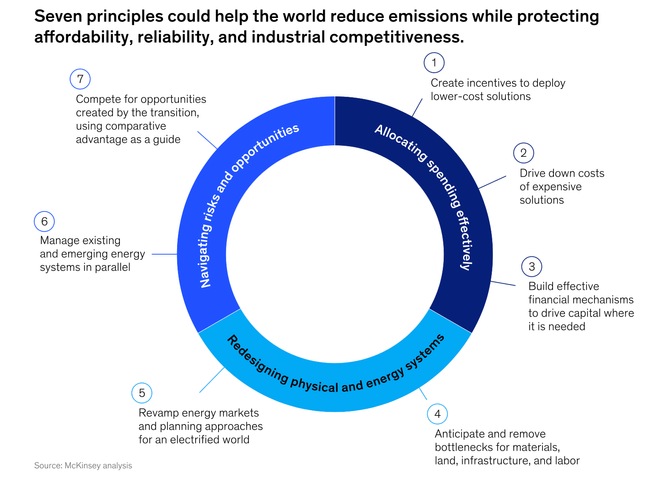McKinsey’s four objectives for a net-zero transition

While much of the conversation and focus around net zero is on reducing greenhouse gas (GHG) emissions, this transition will not be achieved without placing equal emphasis on three other factors.
That’s according to consultants McKinsey that says a successful transition to net zero will require achieving four interdependent objectives – emissions reduction, affordability, reliability, and industrial competitiveness.
In a report titled ‘An affordable, reliable, competitive path to net zero’, McKinsey experts say that although there has been positive action and meaningful momentum, the world is simply not on track (or even close) to achieving the 1.5°C global warming goal set out in the Paris Agreement.
To meet that goal, countries and companies have committed to reaching net-zero emissions of CO2 and reducing emissions of other GHGs but progress has been slow and deadlines too elongated.
During the so-called first global stocktake at COP28 in Dubai, a report published by UN Climate Change showed that national climate action plans (NDCs) would only lower GHG emissions to 2% below 2019 levels by 2030. The science tells us that a 43% reduction is needed.
As an example, energy produced from renewable sources stood at 8% in 2010, and had risen to just 12% by 2021. On this kind of trajectory, numerous sources suggest net zero will not arrive this century.
So much for the doom and gloom – McKinsey offers a glimmer of hope in the shape of those four objectives and seven principles to help stakeholders navigate the next phase.
“The net-zero transition is too often regarded as a singular problem,” states the report. When in fact, it is four connected challenges, with reducing emissions of GHGs at the heart of the transition.
The four objectives for a net-zero-transition
McKinsey identified the following four factors that need to be achieved, and illustrates how they feed each other to achieve net zero.
Emissions Reduction
Self explanatory, and the ultimate goal of reducing GHGs to halt global warming.
Industrial Competitiveness
Ensuring individual countries and companies remain competitive and benefit from opportunities presented during the transition.
Affordability
Making sure sustainable energy, materials and solutions are affordable and cost effective when compared to the traditional solutions.
Reliability
Making sure the supply and reliability of new energy and materials is secure and resilient.
McKinsey’s research has suggested ways to address those four objectives at the same time. These form seven principles that can help stakeholders and decision-makers
The first three show how the world can take action now to reduce the spending required and make the transition more affordable. The next two suggest how to redesign physical and financial systems to protect affordability and reliability over time. The last two principles show how to properly prepare for risks and opportunities.
1: Create incentives to deploy lower-cost solutions.
2: Drive down costs of expensive solutions.
3: Build effective financial mechanisms to drive capital where it is needed.
4: Anticipate and remove bottlenecks for materials, land, infrastructure, and labour.
5: Revamp energy markets and planning approaches for an electrified world.
6: Manage existing and emerging energy systems in parallel.
7: Compete for opportunities created by the transition, using comparative advantage as a guide.
The principles are a framework that could be applied in many ways, says McKinsey’s report, but all require “change of mindset about the transition”.

Stakeholders need to work together to achieve net zero faster
In addition to making long-term commitments to reach net zero, stakeholders should commit to near-term goals.
They should also approach the transition with a sense of participation and collaboration – something that was emphasised at COP28 with its more inclusive approach.
While governments have their role to play fostering a supporting environment for change, the private sector needs to bring innovation to capture the opportunities.
All stakeholders need to work together, on those four objectives outlined in the report, to accelerate the journey to net zero.






